The demonstrations that started the previous day in Budapest, the capital of Hungary, due to the changes in some tax items, continued yesterday. Thousands of demonstrators blocked the main streets and some bridges in the center of the city all day. The demonstrations are expected to continue today.
Oktogon Square, which is the intersection point of the main arteries and tram lines in Budapest, was occupied by the demonstrators, the traffic in the city was paralyzed all day.
Then the demonstrators marched to the Prime Minister’s Residence in the evening. The Prime Ministry was protected by a tight police cordon.
The police detained some demonstrators in the morning and opened the roads to traffic.
Demonstration on the street, crisis meeting at the Prime Ministry
Parallel to the demonstrations yesterday, the government held a crisis meeting in which issues such as the war situation, economic troubles and energy problems were on its agenda, but the new tax regulations were not discussed again at this extraordinary cabinet meeting.
The new regulations, which were quickly passed by the Parliament and entered into force on Monday; It brings some changes in the way the smallest, sole proprietorships operate and the working conditions.
First of all, the regulation, which increases tax items, concerns 450 thousand people.
With the new tax regulation, the government actually aims to close the budget deficit to some extent.
The analyzes point out that the signals that things are not going well in the Hungarian economy have been received by the government for a while.
Annual inflation in the country rose to 12 percent. The Hungarian Central Bank is constantly increasing interest rates, and with the latest intervention, the policy rate was increased to 9.5 percent.
Hungarian Forint has been depreciating fast for a while. The Euro/Forint rate rose from 350 to 412 since the start of the year. The forint’s depreciation worries economists.
The government argues that the source of economic troubles is the war in the region and the embargoes against Russia.

The opposition, on the other hand, acknowledges the existence of economic difficulties in the world, but claims that the main cause of the problems in the Hungarian economy is the government’s populist practices.
Although there are different interpretations between the government and the opposition on the causes of the crisis, all wings of the political spectrum, including the government, agree that fresh financial resources are needed for the Hungarian economy.
The government made a statement last week that the European Union (EU) is ready to reach an agreement with the EU in order to receive the funds that it has stopped paying Hungary since the beginning of the year due to the “lack of the rule of law”.
This means that some of the EU prerequisites may be accepted by the Hungarian government. The most important of these prerequisites is that the European Public Prosecutor’s Office has the authority to conduct investigations in Hungary.
The Hungarian government had previously opposed it on the grounds that it would undermine national sovereignty.
